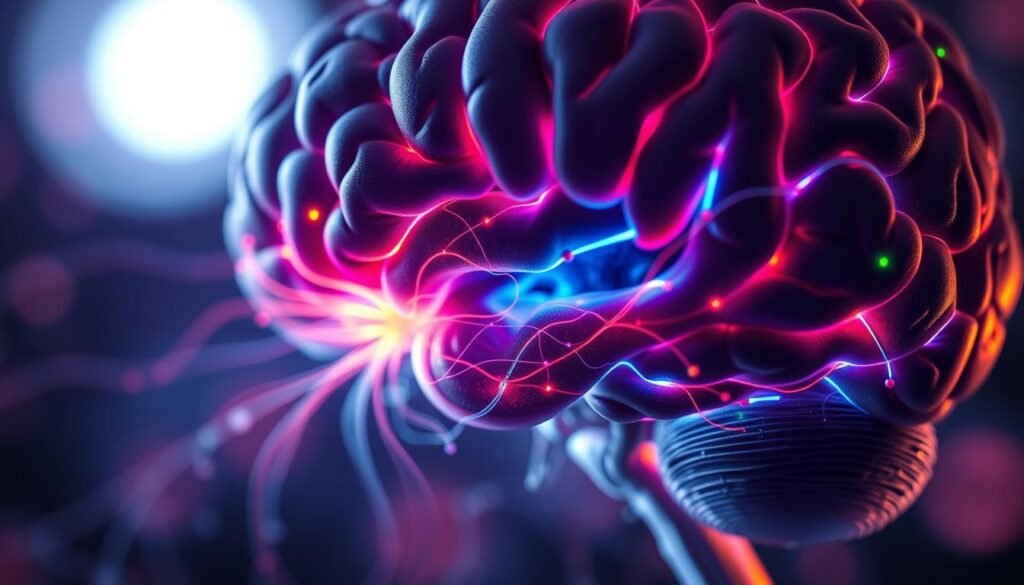Maintaining optimal Cognitive Function is crucial for overall well-being. In today’s fast-paced world, prioritizing NeuroWellness is more important than ever.
By focusing on Brain Health, individuals can improve their emotional well-being and quality of life. This article will explore effective strategies for achieving NeuroWellness and enhancing daily life.
Key Takeaways
- Understanding the importance of Cognitive Function
- Exploring the concept of NeuroWellness
- Discovering strategies for maintaining Brain Health
- Learning how to improve emotional well-being
- Enhancing overall quality of life through NeuroWellness
Understanding Brain Health: What It Means
The concept of Brain Health encompasses not just the absence of neurological disorders, but also the overall resilience and functionality of our brain. It’s about maintaining the highest possible level of cognitive function, emotional well-being, and behavioral performance.
NeuroWellness, a term closely related to brain health, focuses on the proactive steps and practices that contribute to a healthy brain. It involves a holistic approach, incorporating lifestyle choices, mental exercises, and sometimes, professional interventions to enhance brain resilience.
The Importance of NeuroWellness
NeuroWellness is crucial because it directly impacts our quality of life. A healthy brain enables us to handle stress more effectively, maintain strong relationships, and stay productive. Moreover, good Brain Health is linked to a lower risk of cognitive decline and neurological diseases.
By prioritizing NeuroWellness, individuals can take proactive steps towards maintaining their mental health. This includes engaging in activities that stimulate the brain, practicing stress management techniques, and adopting a healthy lifestyle.
Common Misconceptions About Brain Health
One common misconception about Brain Health is that it’s only a concern for older adults. However, brain health is important across all age groups. Another misconception is that cognitive decline is inevitable with age; while age is a factor, lifestyle and other interventions can significantly impact brain health.
Understanding these misconceptions can help individuals take a more informed approach to their Mental Health and Brain Health. By dispelling these myths, people can be motivated to adopt healthier habits and seek professional help when needed.
Key Factors Influencing Brain Health
Maintaining optimal brain health is crucial for overall well-being, and several key factors play a significant role in achieving this goal. A comprehensive understanding of these factors empowers individuals to make informed decisions about their lifestyle choices, ultimately enhancing their NeuroWellness.
Nourishing the Brain
The food we eat has a profound impact on brain health. Nutrition and dietary choices are fundamental to maintaining cognitive function and supporting overall brain well-being. A diet rich in fruits, vegetables, whole grains, and lean proteins provides the necessary building blocks for a healthy brain.
- Incorporate antioxidant-rich foods like berries and leafy greens to combat oxidative stress.
- Choose whole grains over processed foods to maintain stable energy levels.
- Include sources of omega-3 fatty acids, such as salmon and walnuts, to support brain health.
Physical Activity and Brain Health
Exercise and physical activity are not only beneficial for the body but also play a critical role in maintaining brain health. Regular physical activity enhances cognitive function, promotes neuroplasticity, and supports the growth of new neurons.
- Engage in aerobic exercises like walking, cycling, or swimming to boost blood flow to the brain.
- Incorporate strength training to improve overall physical and mental health.
- Practice flexibility and balance exercises, such as yoga, to enhance mental well-being.
The Importance of Sleep
Sleep quality significantly impacts brain health, influencing cognitive function, emotional regulation, and overall well-being. Poor sleep can lead to cognitive decline, while good sleep hygiene practices can enhance brain function.
- Establish a consistent sleep schedule to regulate your body’s internal clock.
- Create a sleep-conducive environment by ensuring your bedroom is dark, quiet, and cool.
- Avoid caffeine and electronic devices before bedtime to improve sleep quality.
Healthy Eating Habits for Optimal Brain Function
Nutrition plays a pivotal role in supporting cognitive health and brain function. A diet rich in essential nutrients can enhance brain performance, improve memory, and reduce the risk of cognitive decline. By making informed dietary choices, individuals can take a proactive approach to maintaining optimal brain function and overall NeuroWellness.
Essential Nutrients for Cognitive Health
A well-balanced diet that includes a variety of whole foods can provide the necessary nutrients for optimal brain health. Omega-3 fatty acids, found in fatty fish, nuts, and seeds, are crucial for brain function and development. Antioxidants, abundant in fruits, vegetables, and berries, help protect the brain from oxidative stress. Additionally, vitamins and minerals such as B vitamins and magnesium play significant roles in cognitive processes.
Foods to Incorporate into Your Diet
Incorporating brain-healthy foods into your diet can be simple and delicious. Fatty fish like salmon and sardines are rich in omega-3s. Nuts and seeds, such as walnuts and chia seeds, are also beneficial. Leafy greens like spinach and kale are packed with antioxidants and other nutrients. Other beneficial foods include berries, which are rich in antioxidants, and whole grains, which provide sustained energy and support overall brain health.
By focusing on these nutrient-dense foods and maintaining a balanced diet, individuals can support their brain health and enhance cognitive function. It’s also important to limit or avoid foods that can negatively impact brain health, such as those high in saturated fats and sugars.
The Role of Physical Exercise in Brain Health
Physical activity is not just beneficial for the body; it’s also essential for a healthy brain. Regular exercise has been shown to enhance cognitive function, promote neuroplasticity, and even reduce the risk of neurodegenerative diseases. In this section, we’ll explore the various ways in which physical exercise contributes to brain health.
Types of Exercise Beneficial for the Brain
Different types of exercise can have unique benefits for brain health. Aerobic exercises, such as running, cycling, and swimming, are particularly effective at improving cardiovascular health, which in turn supports brain function. Resistance training can also contribute to cognitive health by building muscle and boosting overall physical fitness.
Other forms of exercise, like yoga and tai chi, combine physical movement with elements of mindfulness and meditation, potentially enhancing their cognitive benefits. Even simple activities like walking can be beneficial, especially when done regularly and with intensity.
| Type of Exercise | Cognitive Benefits |
|---|---|
| Aerobic Exercise | Improves cardiovascular health, boosts cognitive function |
| Resistance Training | Builds muscle, supports overall physical and cognitive health |
| Yoga/Tai Chi | Combines physical movement with mindfulness, enhancing cognitive benefits |
How Regular Movement Influences Cognition
Regular physical exercise has a profound impact on cognitive function. It improves blood flow to the brain, boosting the delivery of oxygen and nutrients. Exercise also promotes the growth of new neurons and forms new neural connections, a process known as neurogenesis and synaptogenesis.
Furthermore, physical activity stimulates the release of various growth factors, including brain-derived neurotrophic factor (BDNF), which plays a crucial role in neuronal health and plasticity. The cumulative effect of these changes is enhanced cognitive function, including better memory, attention, and processing speed.
By incorporating a variety of exercises into your routine, you can reap the cognitive benefits of physical activity and support overall brain health. Whether it’s through aerobic exercise, resistance training, or mindfulness-based activities, regular movement is a key component of a healthy lifestyle.
Mental Exercises: Keeping Your Mind Sharp
Mental exercises play a significant role in enhancing cognitive resilience and promoting neurowellness. Engaging in mentally stimulating activities can challenge your brain and potentially improve cognitive function.
One effective way to keep your mind sharp is by incorporating puzzles and brain games into your daily routine. These activities not only provide entertainment but also help in building cognitive reserve.
Puzzles and Brain Games to Try
There are various puzzles and brain games that can help improve cognitive function. Some examples include:
- Crosswords and word searches to enhance linguistic skills
- Sudoku and other number puzzles to improve logical reasoning
- Memory games to boost memory and concentration
- Jigsaw puzzles to enhance spatial reasoning and visual processing
Engaging in these activities regularly can help keep your mind active and may reduce the risk of cognitive decline.
The Benefits of Learning New Skills
Learning new skills is another effective way to challenge your brain and improve cognitive function. Acquiring new skills can stimulate the brain’s ability to adapt and change, a concept known as neuroplasticity.
Some benefits of learning new skills include:
| Skill | Cognitive Benefit |
|---|---|
| Learning a new language | Improves memory and linguistic skills |
| Playing a musical instrument | Enhances auditory processing and motor skills |
| Cooking or baking | Develops planning and execution skills |
By incorporating mental exercises and learning new skills into your daily routine, you can take proactive steps towards maintaining a sharp and healthy mind.
Stress Management Techniques for NeuroWellness
Managing stress is crucial for maintaining optimal brain health and overall well-being. Chronic stress can have a detrimental impact on the brain, affecting memory, mood, and cognitive function. Therefore, incorporating effective stress management techniques into daily life is essential for NeuroWellness.
Mindfulness and Meditation Practices
Mindfulness and meditation have been shown to reduce stress and anxiety by promoting relaxation and improving emotional regulation. Regular mindfulness practice can help individuals become more aware of their thoughts and feelings, allowing them to manage stress more effectively.
Meditation techniques such as focused attention and open monitoring can be particularly beneficial. These practices involve training the mind to focus on the present moment, reducing the impact of stressful thoughts and emotions.

Exploring Nature as a Stress Reliever
Connecting with nature is another effective way to manage stress. Spending time outdoors can reduce feelings of anxiety and improve mood. Activities such as walking, hiking, or simply spending time in a garden or park can be therapeutic.
Nature therapy, also known as ecotherapy, involves spending time in nature to promote physical and mental well-being. This can be as simple as taking a short walk outside during a break or spending a weekend camping in the woods.
By incorporating these stress-reducing strategies into daily life, individuals can promote their NeuroWellness and mitigate the negative effects of stress on their brain health.
The Impact of Social Connections on Brain Health
Nurturing social relationships is essential for a healthy brain and overall quality of life. Social connections play a significant role in maintaining cognitive function and overall well-being.
Nurturing Meaningful Relationships
Building and maintaining meaningful relationships is crucial for emotional support and mental stimulation. Engaging in activities with others can help build these relationships, such as joining clubs or groups that align with your interests. This not only expands your social circle but also provides opportunities to develop deeper connections with others.
To foster meaningful relationships, it’s essential to be an active listener and show genuine interest in others. Empathy and understanding are key components in building trust and strengthening bonds. Regular communication and spending quality time with loved ones can also help maintain these relationships over time.
The Effects of Loneliness on Brain Health
Loneliness can have a profound impact on both mental and physical health, including brain health. Chronic loneliness has been linked to an increased risk of cognitive decline and dementia. It’s essential to recognize the signs of loneliness, not just in others but also in ourselves, and take proactive steps to address it.
Engaging in community activities and joining social groups can help alleviate feelings of loneliness. Volunteering is another effective way to connect with others while doing something meaningful. By building a support network, individuals can reduce feelings of isolation and improve their overall well-being.
Research has shown that people with strong social connections tend to have better cognitive function and a lower risk of neurological disorders. Therefore, investing time and effort in nurturing social relationships is crucial for maintaining brain health.
The Connection Between Emotional Well-Being and Brain Health
The intricate relationship between emotional well-being and brain health is complex. Research has shown that there is a significant interplay between the two, with each influencing the other in profound ways. Understanding this connection is crucial for maintaining overall health.
Understanding Emotional Resilience
Emotional resilience refers to the ability to withstand or recover quickly from difficult conditions. It’s a vital component of mental health, enabling individuals to navigate life’s challenges with greater ease. Developing emotional resilience involves cultivating a positive outlook, practicing self-care, and building a strong support network. By enhancing emotional resilience, individuals can better cope with stress, anxiety, and other factors that negatively impact brain health.
Strategies for Maintaining a Positive Outlook
Maintaining a positive outlook is essential for emotional well-being. This can be achieved through various strategies, including practicing gratitude, engaging in activities that bring joy, and setting realistic goals. Additionally, mindfulness and meditation have been shown to have a positive impact on mental health by reducing stress and enhancing emotional regulation. By incorporating these practices into daily life, individuals can foster a more positive outlook, contributing to overall brain health.
To further enhance emotional well-being, it’s essential to stay connected with others, engage in physical activity, and seek professional help when needed. By taking a holistic approach to health, individuals can build resilience and improve their overall quality of life.
The Importance of Regular Health Check-ups
Regular health check-ups are a proactive step towards safeguarding your brain health. These check-ups are not just about detecting health issues early; they’re also about maintaining overall well-being, particularly cognitive function.
Early detection of potential cognitive issues can significantly impact the effectiveness of interventions. By monitoring your brain health regularly, you and your healthcare provider can identify any changes or concerns early on.
Monitoring Cognitive Function
Monitoring cognitive function involves assessing various aspects of brain health, including memory, problem-solving skills, and the ability to perform daily tasks. Regular assessments can help in understanding how well your brain is functioning and whether there are any areas of concern that need to be addressed.
- Memory recall tests
- Problem-solving exercises
- Assessments of daily functioning

When to Consult a Professional
It’s essential to know when to seek professional advice regarding your brain health. If you or your family members notice significant changes in cognitive function, such as memory loss, confusion, or difficulty with problem-solving, it’s time to consult a healthcare professional.
Don’t hesitate to seek help if you’re concerned about your brain health. Early intervention can make a significant difference in managing and potentially improving cognitive function.
Creating a Personalized Brain Health Plan
Developing a tailored approach to brain health is crucial for achieving optimal cognitive function. By incorporating the strategies discussed in this article, individuals can create a personalized plan that suits their unique needs and goals.
Realistic Objectives for Cognitive Well-being
Setting realistic goals is essential for a successful brain health plan. This involves identifying specific areas for improvement, such as enhancing memory or reducing stress, and establishing measurable objectives. Effective Goal Setting enables individuals to track their progress and make adjustments as needed.
Evaluating Progress and Adjusting Strategies
Regular evaluation of one’s brain health plan is vital to ensure it remains effective. This involves monitoring cognitive function, assessing the impact of various strategies, and making adjustments to optimize results. By adopting a proactive and flexible approach, individuals can maximize their chances of achieving optimal brain health and overall NeuroWellness through a well-crafted Brain Health Plan.
